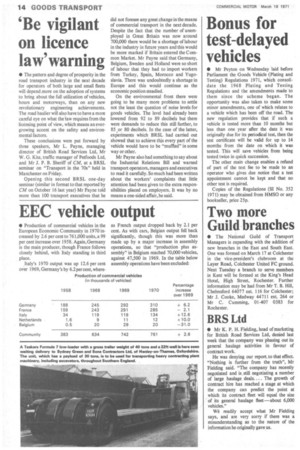'Be vigilant on licence law' warning
Page 16

If you've noticed an error in this article please click here to report it so we can fix it.
• The pattern and degree of prosperity in the road transport industry in the next decade for operators of both large and small fleets will depend.more on the adoption of systems to bring about the full utilization of vehicles, hours and motorways, than on any new revolutionary engineering achievements. The road haulier will also have to have a more careful eye on what the -law requires from the licensing point of view, which means an evergrowing accent on the safety and environmental factors.
These conclusions were put forward by three speakers, Mr L. Payne, managing director of British Road Services Ltd, Mr W. G. Kite, traffic manager of Petfoods Ltd, and Mr J. P. B. Sheriff of CM, at a BRSL seminar on "Transport in the 70s" held in Manchester on Friday.
Opening this second BRSL one-day seminar (similar in format to that reported by CM on October 16 last year) Mr Payne told more than 100 transport executives that he
did not foresee any great change in the means of commercial transport in the next decade. Despite the fact that the number of unemployed in Great Britain was now around 700,000 there would be a shortage of labour in the industry in future years and this would be more marked if Britain entered the Common Market. Mr Payne said that Germany, Belgium, Sweden and Holland were so short of labour that they had to import workers from Turkey, Spain, Morocco and Yugoslavia. There was undoubtedly a shortage in Europe and this would continue as the economic position steadied.
On the environmental front there were going to be many more problems to settle not the least the question of noise levels for goods vehicles. The level had already been lowered from 92 to 89 decibels but there were demands to reduce this still further, to 85 or 80 decibels. In the case of the latter, experiments which BRSL had carried out showed that to achieve this every part of the vehicle would have to be "muffled" in some way or other.
Mr Payne also had something to say about the Industrial Relations Bill and warned transport operators, managers and executives to read it carefully. So much had been written about the workers' complaints that little attention had been given to the extra responsibilities placed on employers. It was by no means a one-sided affair, he said.




























































































